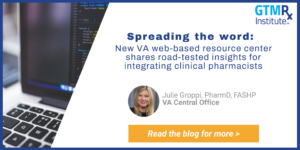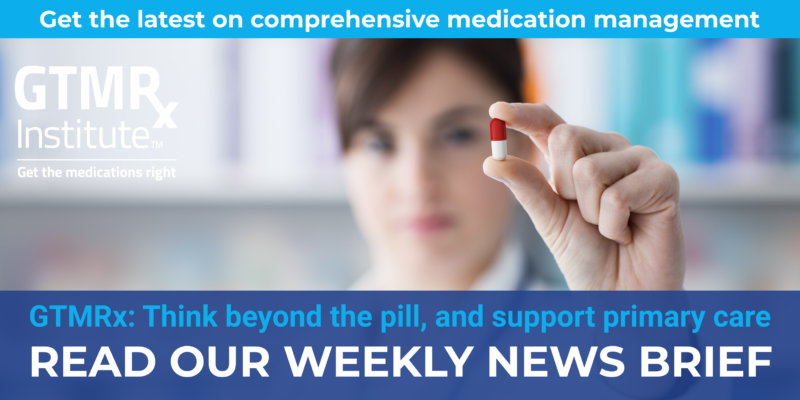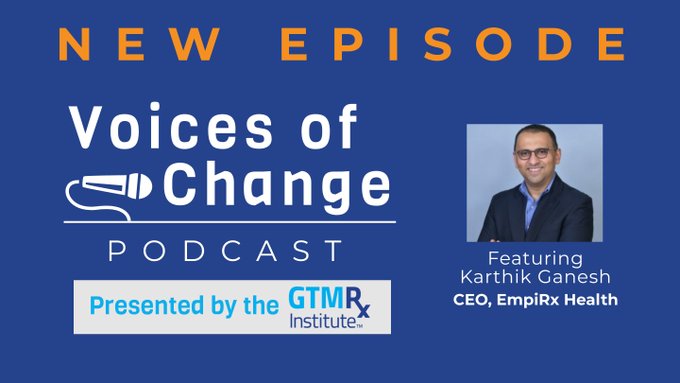Practice Transformation
Increased use of generics, biosimilars help control costs
Biosimilars and generic drugs may slow drug cost growth in 2022, Modern Healthcare reports. Drug prices only increased 1.9% in 2021, partly due to new biosimilars and generics, according to an American Society of Health-System Pharmacists report. “Biosimilars really took off this year,” Eric Tichy, PharmD, MBA, division chair, supply chain management, at Mayo Clinic, said in a release. “A couple of years ago there was a lot of consternation about the uptake of biosimilars being slow, but that has turned around. Their use is likely to continue growing, and it’s saving the healthcare system a lot of money.” (Modern Healthcare; AJHP; announcement)
GTMRx: Think beyond the pill, and support primary care
What do health care leaders consider “must haves” for the rest of 2022 and beyond? Executive director Katherine H. Capps asked that question of a few leaders involved with GTMRx. Among the responses: Employers need to exercise their spending power and focus on implementing more innovative, comprehensive health plans. They need to think beyond the cost of a specific medication and consider how medications are selected, managed and monitored. Another response: Support for primary care, which currently accounts for only about 5% of US health care spending. (Pharmacy Times)
Evidence & Innovation
MA plans get 8.5% revenue increase
Medicare Advantage plans can expect an 8.5% average increase in revenue in 2023 according to the CMS final rate notice. The increase is more than 0.5% higher than what CMS originally proposed, but this follows a trend of increased effective growth rates in the time between the advance notice to the final document, Modern Healthcare reports. CMS also finalized a coding pattern adjustment of 5.9%, the lowest adjustment required by law. The adjustment reflects coding differences between MA and fee-for-service Medicare providers and has not been changed since 2018. (Modern Healthcare)
Primary care burnout a global concern
The pandemic has left many general practitioners/primary care providers around the world depressed, anxious and burned out, according to a literature review published in the British Journal of General Practice. Among the sources of stress during the pandemic: changed working practices, exposure to COVID-19 and inadequate PPE, information overload and poor communication across health sectors. “Understanding the key sources of stress for GPs could enable an evidence-based approach to the development of future policy …which may help to protect the future wellbeing of the workforce,” researchers conclude. (BJGP; announcement)
Policy Solutions
FTC & DOJ hear about PBM “oligopoly”
The consolidation among the three biggest pharmacy benefit managers and insurers has reduced access to the lowest-cost drugs, Dr. Madelaine Feldman, a rheumatologist in New Orleans told the FTC and the Justice Department. The FTC and the Justice Department are reworking merger requirements. PBMs often favor the highest-cost options for rheumatoid arthritis drugs by taking generic alternatives off their formularies, she said. “Now that the big three PBMs merged with some of the largest health insurance companies, we have an oligopoly that has resulted in a broken system, rife with conflicts of interest.” (Modern Healthcare)
In Case You Missed It!
Celebrating 3 Years of Impact: GTMRx Institute Turns 3!
The Get The Medications Right Institute (GTMRx) is celebrating 3 years of impact and advancement of our goals. Now, more than ever we remain committed and anchored in our mission and goals to:
- A personalized, patient-centered, systematic and coordinated approach to medication use will vastly improve outcomes and reduce overall health care costs.
- We must align systems of care to integrate comprehensive medication management, engaging patients to ensure that they are willing and able to take those medications that are indicated, effective, and safe, to optimize their outcomes.
- We need immediate delivery system, payment, and policy transformation to streamline clinical trials and reduce costs of bringing drugs to market while enabling successful, broad-scale adoption of integrated, comprehensive medication management (CMM) services.
- Appropriate diagnosis and access to advanced diagnostics with companion/complementary and pharmacogenetics (PGx) testing is essential to target correct therapy.
- Success requires team-based, patient-centered care models that recognize appropriately skilled clinical pharmacists as medication experts who work in collaborative practice with physicians and other providers.
Thank you to all who have joined us and aided in our mission to advance personalized, patient centered, team-based care. If you aren’t already a part of the Institute, you can join us by agreeing to our belief statements here: https://gtmr.org/become-a-signing-member/
GTMRx Executive Roundtable
Optimizing medication use for accountable care success: Experts from CMS Innovation Center, VA, Cleveland Clinic, MHealth Fairview and other leading organizations share insights and offer concrete recommendations
What does accountable care look like? How does medication optimization support ACOs? Which business models will drive access, across the continuum of care, to team-based services that ensure safe, effective and appropriate use of medications and gene therapies?
These are just three of the questions experts considered at the April 13 GTMRx Executive Roundtable, co-hosted by the Institute for Advancing Health Value (formerly the Accountable Care Learning Collaborative).
The invitation-only virtual executive roundtable featured an array of experts, including speakers from the CMS Innovation Center, the VA, Cleveland Clinic and the American Association of Colleges of Pharmacy. Two CMS Innovation Center leaders kicked off the event: Sarah Fogler, PhD, Deputy Director, Patient Care Models Group, and Pauline Lapin, MHS, Director of Seamless Care Models Group.
Other presenters included Katherine Laurenzano, MD, medical director for Primary Care Monitoring and Oversight, Office of Primary Care, Department of Veterans Affairs; Erick Sokn, PharmD, MS, pharmacy director, Population Health – Cleveland Clinic; and Amanda Brummel, PharmD, BCACP, vice president of Clinical Ambulatory Pharmacy Services, MHealth Fairview
Breakout sessions offered the opportunity for facilitated discussion about pressing topics as population health, social determinants of health, data-driven transformation and risk management. The discussions — and the resulting recommendations — will guide our work as we develop our ACO toolkit. More broadly, it will guide us as we advocate for personalized, team-based, comprehensive primary care and specialist models that offer a more coordinated, systematic approach to medication use, thereby saving lives and saving money.
Thank you to all who joined the event and our robust discussions. If you missed it, you can learn more here.
GTMRx Workgroup Update
On April 13, Amanda Brummel, Pharm.D., BCACP, vice president, Clinical Pharmacy Services, Fairview Pharmacy Services, spoke to the GTMRx Best Practices and Innovative Solutions Subgroup meeting to inform their work on their ACO stakeholder toolkit. Dr. Brummel covered topics such as: ACO quality measures of success, benefits and investment needs for CMM, greatest challenges/pain points for ACOs, and more.

GTMRx Experts Reveal Health Care Must-Haves for 2022 and Beyond
Leading Institute for Comprehensive Medication Management Shares Strategies for Improving Inefficiencies in Health Care and Reforming Medication Management
“Collaborative practice agreements, using clinical pharmacists, who are right there in the community and know the patients. And specifically with homeless patients, I think there does need to be a little more outreach, the clinical pharmacist going out, through collaborative practice agreements, and seeing patients, and helping us manage their complex needs.. And because it is of course, a little challenging to expect homeless patients to visit clinics. But I’ll say this, they’re much more likely to respond if you meet them in the community rather than a traditional medical office practice.” – Michael Hochman, MD primary care physician and CEO of Healthcare in Action, SCAN’s Homeless Medical Group
Read more in our press release.
GTMRx in the News
While the health care industry reevaluates processes and care from the fallout of the COVID-19 pandemic, patient experience optimization has arguably never been more of a priority for the health community at-large. A big part of optimizing the experience includes paying attention to and changing how medications are selected, managed and monitored to avoid misuse, overuse or underuse.
Read more from GTMRx Executive Director, Katie Capps, in Healthcare Business Today.
The Right Drug Dose Now Act Introduced Feb. 28, 2022
On February 28, 2022, the GTMRx Institute issued a letter of support for the Right Drug Dose Now Act which was introduced on the same day. (See the press release from Congressman Swalwell here.)
GTMRx’s Precision Medicine Enablement via Advanced Diagnostics Workgroup invited congressional staff from the Personalized Medicine Caucus to present on draft PGx legislation underway on two occasions. The Personalized Medicine Caucus, co-chaired by Representatives Tom Emmer (R-MN) and Eric Swalwell (D-CA), engages members in a constructive dialogue about legislative and regulatory policies that can help realize the full potential of personalized medicine. The recommendations that came out of these discussions were put into our Letter to the Personalized Medicine Caucus Co-Chairs—Representatives Tom Emmer (R-MN) and Eric Swalwell (D-CA)—on the Right Drug Dose Now Act.
Some of the GTMRx recommendations to the Caucus included:
- Incorporating comprehensive medication management definition and language.
- Combining PGx testing with the CMM process of care.
- Expanding implementation of EHR guidelines, education awareness campaigns, and reporting.
- Clarifying the definition of adverse drug events.
A Comprehensive Overview of the Institute, It’s Vision, Mission and Leadership
The Get the Medications Right Institute is working to decrease misuse, overuse and underuse of medications and avoid waste by advancing comprehensive medication management to ensure appropriate and personalized use of medications and gene therapies. Learn more in this brochure.
Interested in supporting our work?
Please contact Rob Dribbon (e: [email protected])

Join us to be part of meaningful change
Irma, like many others, struggles as a result of our current trial-and-error approach to medication. That is why we advocate for a new, comprehensive approach to medication use and prescribing. As a non-profit 501(c)(3) and 501(c)(4) organization, the GTMRx Institute and Foundation relies on funding from our supporting members. We ask that you consider becoming a Supporting Signing Member so we can continue to provide relevant, timely resources to get the medications right!
If you’re interested in supporting the Institute or Foundation at a higher level, please contact us. Your dollars will bring about meaningful change for people like Irma.
AmazonSmile is an easy way for 0.5% of your qualified purchases go to the GTMRx Foundation at no cost to you. And signing up is simple—go to smile.amazon.com and select “Get the Medications Right Foundation” as your charity of choice. If you prefer to directly donate instead, you can do so here.
Adding the foundation on AmazonSmile will help us continue to provide no cost educational webinars, issue briefs, weekly news briefs and promote the need for transformation of our current system of medication use through social media campaigns.





